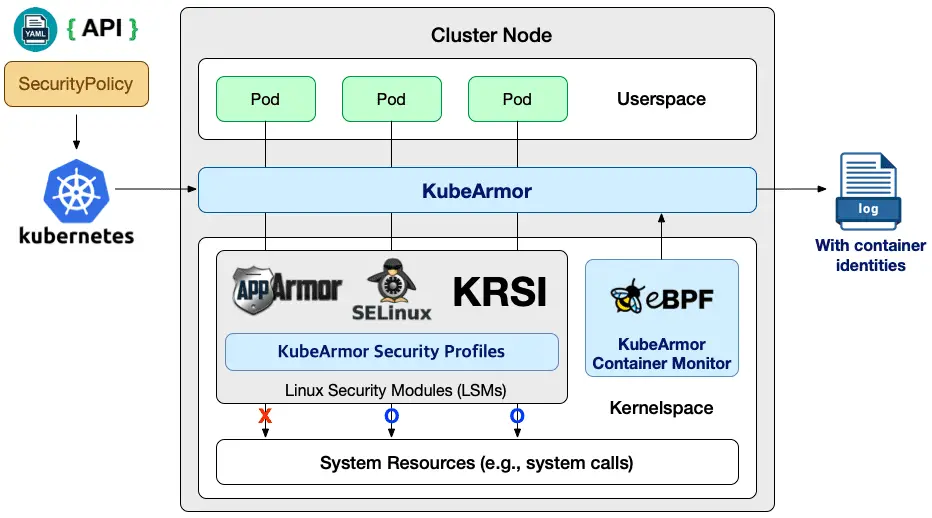
KubeArmor
KubeArmor is a container-aware runtime security enforcement system that restricts the behavior (such as process execution, file access, networking operation, and resource utilization) of containers at the system level.
KubeArmor operates with Linux security modules (LSMs), meaning that it can work on top of any Linux platforms (such as Alpine, Ubuntu, and Container-optimized OS from Google) if Linux security modules (e.g., AppArmor, SELinux, or KRSI) are enabled in the Linux Kernel. KubeArmor will use the appropriate LSMs to enforce the required policies.
KubeArmor is designed for Kubernetes environments; thus, operators only need to define security policies and apply them to Kubernetes. Then, KubeArmor will automatically detect the changes in security policies from Kubernetes and enforce them to the corresponding containers without any human intervention.
If there are any violations against security policies, KubeArmor immediately generates audit logs with container identities. If operators have any logging systems, it automatically sends audit logs to their systems as well.
Functionality Overview
- Restrict the behavior of containers at the system level
Traditional container security solutions (e.g., Cilium) mostly protect containers by determining their inter-container relations (i.e., service flows) at the network level. In contrast, KubeArmor prevents malicious or unknown behaviors in containers by specifying their desired actions (e.g., a specific process should only be allowed to access a sensitive file).
For this, KubeArmor provides the ability to filter process executions, file accesses, resource utilization, and even network operations inside containers at the system level.
- Enforce security policies to containers in runtime
In general, security policies (e.g., Seccomp and AppArmor profiles) are statically defined within pod definitions for Kubernetes, and they are applied to containers at creation time. Then, the security policies are not allowed to be updated in runtime.
To avoid this problem, KubeArmor maintains security policies separately, which means that security policies are no longer tightly coupled with containers. Then, KubeArmor directly applies the security policies into Linux security modules (LSMs) for each container according to the labels of given containers and security policies.
- Produce container-aware audit logs
LSMs do not have any container-related information; thus, they generate audit logs only based on system metadata (e.g., UID/GID, and process ID). Therefore, it is hard to figure out what containers cause policy violations.
To address this problem, it uses an eBPF-based container monitor, which keeps track of process life cycles in containers, and converts system metadata to container identities when LSMs generate audit logs for any policy violations from containers.
- Provide easy-to-use semantics for policy definitions
KubeArmor provides the ability to monitor the life cycles of containers’ processes and take policy decisions based on them. In general, it is much easier to deny a specific action but it is more difficult to allow only specific actions while denying all. KubeArmor manages internal complexities associated with handling such policy decisions and provides easy semantics towards policy language.
- Support network security enforcement among containers
KubeArmor aims to protect containers themselves rather than interactions among containers. However, using KubeArmor a user can add policies that could apply policy settings at the level of network system calls (e.g., bind(), listen(), accept(), and connect()), thus somewhat controlling interactions among containers.
Changelog v1.0.1
This release fixes some bugs:
- Fix AppArmor issues
- Fix Docker and Containerd issues (not able to monitor pods already deployed in Kubernetes before KubeArmor)
- Fix automated testing scripts
- Fix self-managed k8s installation scripts
- Fix Vagrantfile
This release has some updates:
- Update deployment YAML files for different environments (Docker-based k8s, Containerd-based k8s, microk8s, and GKE)
- Update deployment, contribution, development, testing, self-managed k8s installation guides
Install & Use
Copyright 2021 Authors of KubeArmor